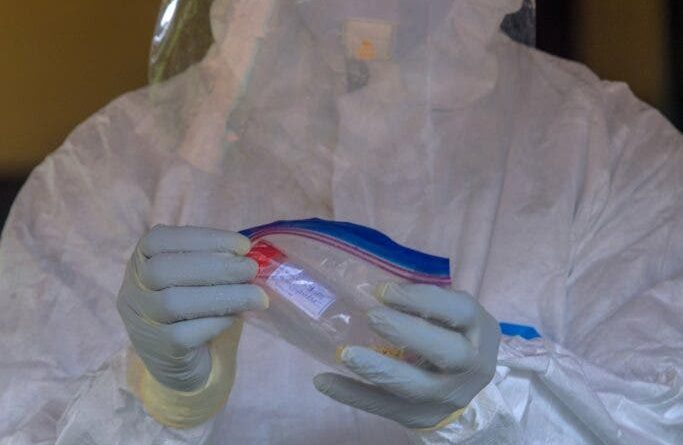Implications for business and workforce globally (1)
By Tunde Oyediran
In the build-up to the UFC Strawweight Women’s Championship fight of March 7th, 2020, the Polish contender, Joanne Jedrzejczyk attracted stern criticisms after she posted, to her Instagram story, a photoshopped picture of her wearing a gas mask with series of laughing emojis while standing behind her Chinese opponent; the reigning Strawweight Women Champion, Zhang Weili. The now-deleted provocative post was believed to have been about the Coronavirus outbreak that was ravaging the champion’s home country at the time. Weili’s response echoed the thoughts and disappointment of people around the world as she insisted that an ailment, which has ended thousands of Chinese lives, should never be trivialized.
Like Joanne, most people had a false sense of reality concerning the virus as it was dubbed the ‘Chinese virus’. Save for ‘Patient 31’, who infected over 1000 people in less than 10 days, South Korea would similarly have downplayed the potency of the virus. Coronavirus (Covid-19) is an infectious respiratory disease that was first reported in Wuhan, China in December 2019. Like the Spanish Flu of 1918, it spreads primarily through droplets of saliva, sneezing and discharge from an infected person. Research has also shown that the virus can survive for several hours on surfaces, and even in the air.
The World Health Organization (WHO) declared it a pandemic in January 2020. Unlike the Spanish Flu, Covid-19 is more of an acute pneumonia with demographics of infected people found in adults and fatalities reported mostly in older people over 65 years who had underlying health conditions.
Without a known cure, Covid-19 has spread to over 200 countries infecting over 4.4 million people globally with 2.5 million active cases, 1.7 million recoveries, and over 300,000 fatalities. According to estimates by the WHO and the US Centre for Disease Control (CDC), about 20 – 50% of infected people are asymptomatic, which implies that restricted physical interactions, improved personal hygiene and the compulsory use of face masks might be the most effective ways of curbing the spread of the virus. At the time of writing, the pandemic has crippled socio-economic activities with a 55% active rate, 37% recovery rate, and 6.7% fatality rate. By the time this article gets to you, the active and fatality cases could look scarier.
Today, economies have crumbled so badly that the International Monetary Fund (IMF) predicts a 3% contraction in the global economy in 2020; the steepest downturn since the Great Depression. Across the world, an estimated US$12 billion worth of economic activities were said to have been lost in the average lockdown period of 45 days. The Chinese economy contracted by 6.8% in Q1 2020, which represents a loss of over US$200 billion. For context, only about 150 countries have an annual GDP of more than US$250 billion. The unemployment rate in the United States of America increased by 10.8% month on month (m-o-m) accelerating to 14.7% in April 2020; the highest rate and largest m-o-m growth since 1948 when the data reporting began. Brent crude prices crashed to a low of US$19 per barrel (pb) and the US WTI crumbled into negative territory trading at (-US$37) pb in April 2020. The pandemic has caused unprecedented disruption of global health infrastructure as health workers are not only experiencing unimaginable strain in protecting lives but are also battling to save theirs. Refuse collectors, supermarket attendants, delivery personnel, law enforcement agents, etc. have now joined the league of superheroes, without capes, alongside health workers and journalists.
With massive lay-offs, grounded fleets, and several bailout requests, the aviation industry is easily the worst hit by the pandemic. A KPMG survey projects a loss of over US$250 billion for the industry in 2020. Educational systems have taken a mandatory recess to and have reconvened online. The streets are deserted as online interactions and social distancing replaces physical social interactions. Likewise, Religious activities as public gatherings are presently outlawed or restricted based on what region of the world you are talking about.
The outbreak of the pandemic has prompted unprecedented alterations in religious rituals, traditions, sports and laws. Entry into two of Saudi Arabia’s holiest cities – Mecca and Medina – are now prohibited. Ramadan was largely without gatherings in mosques for Tarawih prayers and large Iftar dinners. Pope Francis read his ‘Urbi et Orbi’ message in a near-empty St. Peters, Basilica on Easter Sunday. The French customary ‘bise’ greeting, which involves kissing on the cheek, has been banned. The Tokyo 2020 Olympic games have been postponed to 2021. The marriage law in New York has been amended to include digital marriages. Nature has forced humans to take a break from all its activities. The short-term effects of this pandemic are evident everywhere but the long-term consequences on every sphere of human life are left to be imagined.
Whilst all hands are on deck to ensure that a cure for the virus is found in the shortest possible time, numerous measures have been adopted globally to prevent the spread of the pandemic. For most countries, a combination of social distancing, quarantine, self-isolation, total lockdown, use of face masks, gloves, and mandatory handwashing and hand-sanitizing practices have been adopted at varying degrees to further curtail spread of the virus. These measures are only precautionary until a cure is found. Fortunately, scientists have made headway in discovering existing drugs that are promising just as immunologists have found antibodies that might fight the potency of the virus. With the first human clinical trial for prospective vaccines on the way in Europe, Madagascar’s herbal remedy appears to have caught global attention as the country brags of 52% recovery rate with no fatality from the virus to date. Although the WHO has dismissed Madagascar’s herbal tonic as a cure for COVID-19, it has called for tests of its efficacy as a potential treatment.
The immediately apparent fallouts of the virus are the economic recession largely due to massive layoffs, bankruptcy, crash in commodity prices, trade and global supply chain disruptions as well as the opportunity cost of the pandemic’s financial burden. The more insidious concerns are that the socio-cultural adjustments and psychological alterations made to survive the pandemic could have a far-reaching effect on the mental health of most people. Predictions of a potential second, third, or even fourth wave of the virus implies that we must be prepared to live with this virus for longer than previously anticipated. Therefore, below are some COVID-19 inspired changes that we expect to see going forward:
Politically, government bailouts of companies and employees may have set a precedence that will be difficult to roll back. More so, the need for contact tracing and social monitoring as a result of the pandemic may have overlooked the personal privacy rights of people. Consequently, governments are now in possession of certain information that could result in infringement on the fundamental human rights of its citizens. As people spend more time on the internet, countries will move to censor assess to certain contents online. Socialism might have crept in through the back door. Economically, most economic pecuniary activities and interactions have largely relocated online. Hence, we expect that remote working will outlive the pandemic and become the rule, no longer the exception. The pandemic will drive a boom in the ‘geek’ economy whilst globalization recedes. The future of work is virtual and tech powered. At national levels, debt reliefs and restructuring will dominate economic conversations on the back of unbudgeted spending in the face of COVID-19. With dwindling revenues and increasing expenses, governments will look to increase taxes on the one hand and encourage low-interest rates to drive economic activities on the other hand.
For businesses, the need to reduce operating expenses will not only mean salary cuts and massive staff layoffs, it will also mean urgent evolution to end-to-end digital product & service offerings – especially for services that hitherto required physical interaction. There are documented positives of remote working as most families spend more time together thereby resulting in a better quality of lives. On the flip side however, loss of jobs, death of loved ones and lack of social interaction, could result in depression, loneliness, and increased cases of domestic violence for many others. The stigma associated with seeing and knowing COVID -19 survivors or non-survivors in a country like Nigeria might prevent people from asking to see them, even if they need to. There will be an increase demand for professional counselors and therapists.
Educationally, the transition to online learning is a welcomed development as it democratizes education irrespective of geographical location, age, and social status. Although some components of peer to peer learning may have been lost as education goes virtual, teachers and lecturers must now ensure they are equipped with the requisite skills to make up for that loss. Tech experts have argued that the pandemic is not only a health and economic challenge, but it is also an information issue, as we struggle to precisely identify hotspots to facilitate easier tracking of infected people. The collaboration between Google and Apple seeks to address the contact tracing problem. Hence, we expect that more location tracking and health monitor apps will be developed. Global lockdown has changed habits and accelerated the adoption of technology as years of changes have occurred in a few weeks. The pandemic has also hastened growth in the digital economy – especially in medical technology. Recent data revealed that 80% of healthcare in the US today is being done digitally.
Socially, physical leisure and hospitality activities will bear no resemblance to what they were pre-COVID-19 as more people replace ‘eat-out’ with ‘eat-ins’, suspend vacations and reduce business travels. Weddings, funerals, and birthday parties attendance will now be limited to family members and close friends, effectively marking an end to large jamboree parties in the foreseeable future. This will cripple the hospitality and leisure businesses. Cosmetics companies earnings will take a nosedive since remote working, schooling, and worshipping reduces the regular use and demand for perfumes, fragrances, make-up, etc. Fashion Designers and dressmakers won’t be spared in this debacle as the need to limit expenses to essentials will reduce patronage of their products and services. The aviation industry will usher in an era of sanitized travels. This means that air travels will now require immunity passports to affirm the presence of enough antibodies in every passenger before they are adjudged as ‘fit-to-fly’. Experts have projected that over 70 areas of the passenger’s flight journey will be altered post-COVID-19. This will eventually make air transportation more expensive. Proponents of the sharing economic model, who have argued that it is the model of the future, will be busy responding to critics amidst Airbnb’s novel challenges. The ban on international travel and the need for social distancing has frustrated Airbnb hosts into either pulling out to find longer-term occupants or opting to offer isolation suites only. With bookings declining by as much as 96% in some cities, the company has had to lower its valuations to US$26 billion from US$31 billion reported in September 2017. The pandemic seems to be disrupting the disruptor.The breakneck speed and sophistication that characterize today’s technological advancement, most of which have been developed to replace physical interaction, provides a viable alternative to pre-COVID-19 life. We should be prepared to live with this virus for a while amidst expert prediction of multiple waves of the pandemic and a likely cure reported at least 9 -12 months away.
This pandemic-induced crisis provides us with the opportunity to re-examine some human activities and actions that make the outbreak of pandemics more likely and pose a significant danger to our continued existence. Firstly, the drive for rapid urbanization and industrialization has destroyed the natural habitat of wild animals who now co-exist with humans in the same ecosystem, making the interactions between humans and these virus-carrying animals more probable. A recent report revealed that approximately 5,760 acres of wildlife habitats are destroyed daily on account of urbanization, deforestation, etc. Secondly, man’s appetite for meat consumption has done more harm than good. With meat consumption projected to grow by 1.4% annually through 2023, humans will become more susceptible to virus outbreaks. Aside from the potential risk of contracting viruses from meat, its consumption plays a significant role in increasing carbon emission by humans. Lastly, human activities – such as burning fossil fuel – emits greenhouse gases, which are the leading cause of climate change and have destroyed natural wildlife habitats. These animals, in search of shelter and food to ensure survival, have been forced to seek shelter in man’s ecosystem. In conclusion, man’s daily activities put us all in danger of being consumed by pandemics and climate changes. This break provides a compelling opportunity for us to reflect and redefine what ‘normal’ should mean to our continued existence. We must focus on promoting a healthier and climate-friendly environment to avert another pandemic or climate inspired crisis.
Related
Source link





